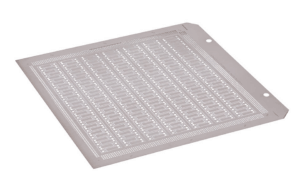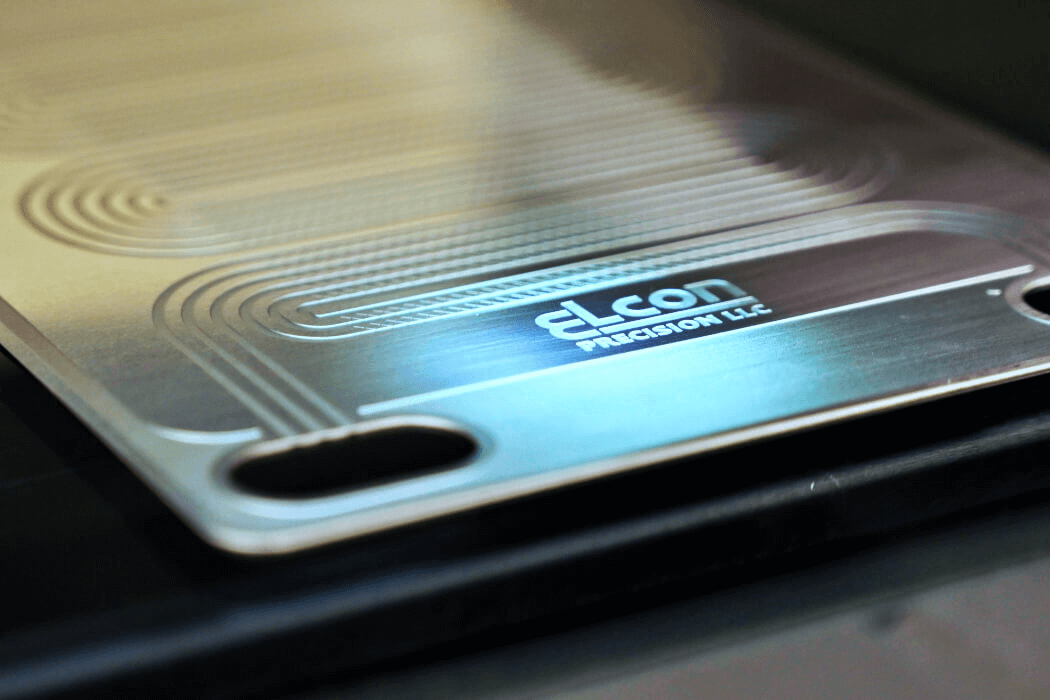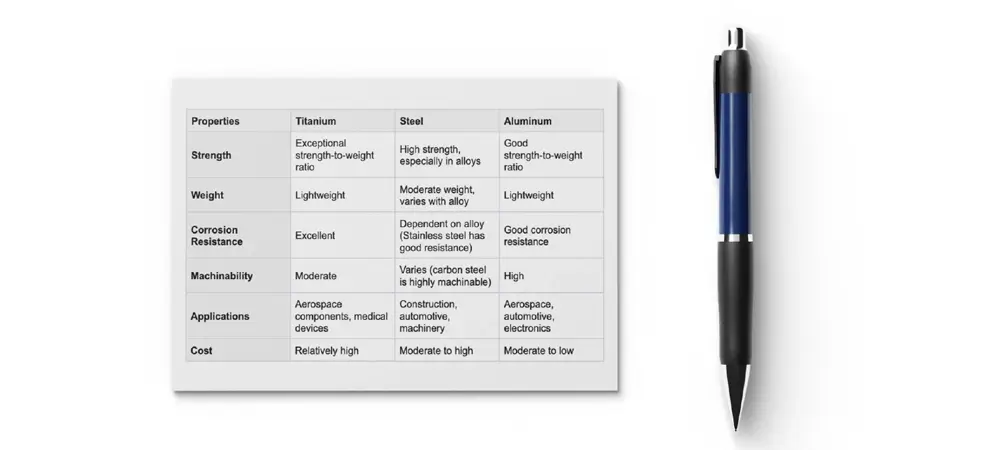In precision metal manufacturing, every choice made during manufacturing can significantly impact the final components' quality, reliability, and performance. With so much on the line, material selection is one of your most important decisions.
Choosing the right material for your components can impact their performance, cost, and manufacturability because popular metals such as titanium, steel, and aluminum each have their own unique characteristics.
The choice of material is especially important when using photochemical etching to manufacture precision products because each metal reacts differently to chemical etching, affecting the final product's accuracy, repeatability, and complexity.
At Elcon Precision, we have over 50 years of experience consistently delivering high-quality precision components and assemblies designed for crucial applications. Leaders in photochemical etching, our custom-designed manufacturing services and in-depth knowledge of materials enable us to produce industry-best parts and components for even the most complex projects.
In this article, we explain the importance of material selection in precision metal manufacturing and analyze and compare titanium, steel, or aluminum to show how material choice can influence the end product.
The Role of Materials in Precision Manufacturing
Material selection in precision metal manufacturing is a strategic choice that impacts the manufacturing process.
Different metals exhibit unique properties, influencing the precision and functionality of the final product. Whether it’s titanium, with its exceptional strength-to-weight ratio and corrosion resistance, or aluminum, with its remarkable combination of lightweight construction and high thermal conductivity, each metal's unique characteristics make it suitable for specific applications.
The right material can enhance performance, ensuring the component meets stringent quality standards and functions optimally within its intended application. A component's manufacturability, including factors such as ease of fabrication and durability, is also determined by its materials.
Each material comes with different costs too, which need to be considered as they directly contribute to the overall manufacturing expenditure.
Significantly influencing the performance, cost, and manufacturability of the components produced, understanding material properties is crucial for achieving the delicate balance between precision, cost-effectiveness, and manufacturability.
Why Titanium is Called the Wonder Metal
Lightweight, incredibly strong, and delivering exceptional corrosion resistance, titanium has quickly become the preferred material for many applications in the medical, aerospace, and renewable energy industries. Known as the ‘wonder metal’ due to its unique characteristics, its applications are far-reaching.

In the medical industry, titanium is used in a range of surgical and dental equipment due to its unique ability to bind with bone and living tissue. An ideal material for orthopedic implants such as knee and hip replacements, its added strength-to-weight ratio and corrosion resistance also make it well-suited to a number of other medical instruments as well.
In aerospace, titanium’s strength-to-weight ratio is essential for the production of precision components for numerous applications, from engine components and exhaust systems to fasteners, fittings and fuel system components.
As easy as titanium is to use, it can be equally difficult to machine because of its low thermal conductivity and tendency to harden. Custom titanium machining often requires specialized tools and techniques to mitigate these challenges to create high-quality titanium components for critical applications.
As leaders in precision titanium manufacturing, Elcon's advanced titanium etching process and advanced titanium machining ensure precise and uniform material removal from titanium components, enhancing strength and durability.
As the only etching company on the US West Coast that is ISO 9001-2015, AS9100D, and ITAR-certified, our factory accreditation makes us the trusted team for titanium etching, consistently delivering precision titanium products for the renewable energy, medical, aerospace, and defense industries.
For more information on the benefits of titanium as a material, read our article on Maximizing Strength and Durability with Titanium Etching.
How Steel is Shaping the Precision Manufacturing Industry
Often chosen for its exceptional strength and durability, steel is a time-tested workhouse in precision metal manufacturing. The advantages of steel in precision manufacturing lie in its versatility, cost-effectiveness, and ability to withstand heavy loads, making it the material of choice across a spectrum of industries and applications.

|
Stainless Steel Type |
Characteristics |
|
Austenitic Stainless Steel (e.g., 304, 316) |
|
|
Ferritic Stainless Steel (e.g., 430, 446) |
|
|
Martensitic Stainless Steel (e.g., 410, 420, 440) |
|
|
Duplex Stainless Steel (e.g., 2205, 2507) |
|
|
Precipitation-Hardening Stainless Steel (e.g., 17-4PH) |
|
|
Super Austenitic Stainless Steel (e.g., AL-6XN, 254 SMO) |
|
|
446 Stainless Steel |
|
With various alloy options, such as carbon steel, stainless steel, and spring steel, manufacturers can tailor their properties to meet the specific requirements of their applications. Carbon steel, recognized for its robustness, is used widely for applications in the construction, automotive, and machinery industries, while stainless steel is an ideal material for medical devices, aerospace components, and architectural structures.
At Elcon, we use specialized etching techniques for intricate detailing and complex patterns on stainless steel surfaces. We use stainless steel to manufacture high-quality components that guarantee performance, reliability, and longevity in demanding environments. Discover more about our steel etching services.
What Makes Aluminum a Valuable and Versatile Material
Aluminum's low density and lightweight properties make it a valuable material for precision metal manufacturing. Its remarkable strength-to-weight ratio makes it an ideal choice for applications where reducing weight is critical, such as aerospace components, automotive parts, and electronic devices.
Aluminum's versatility extends to its machining properties - it can be milled, turned, and drilled easily, increasing manufacturing efficiency. Its excellent conductivity further enhances its appeal in precision applications like electronics and heat exchangers.
With its adaptability, corrosion resistance, and cost-effectiveness, aluminum is preferred in weight-sensitive industries, solidifying its status as a preferred material in precision metal manufacturing.
Comparing the Three Materials
The first thing to consider when choosing a material for your manufacturing is the application's specific requirements. The unique characteristics of titanium, steel, and aluminum make them more suitable for certain applications than others.
Titanium's strength, low weight, and corrosion resistance make it ideal for aerospace and medical applications, while steel's versatility suits construction and machinery.
Aluminum's lightweight nature finds applications in aerospace and electronics.
To choose materials that perform optimally and are cost-effective, you must first carefully consider the project's requirements.
|
Properties |
Titanium |
Steel |
Aluminum |
|
Strength |
Exceptional strength-to-weight ratio |
High strength, especially in alloys |
Good strength-to-weight ratio |
|
Weight |
Lightweight |
Moderate weight, varies with alloy |
Lightweight |
|
Corrosion Resistance |
Excellent |
Dependent on alloy (Stainless steel has good resistance) |
Good corrosion resistance |
|
Machinability |
Moderate |
Varies (carbon steel is highly machinable) |
High |
|
Cost |
Relatively high |
Moderate to high |
Moderate to low |
Strengths and Weaknesses:
- Titanium: Exceptional strength, lightweight, corrosion-resistant, but relatively expensive and moderate machinability.
- Steel: High strength, versatile, and durable, but heavier and may require surface treatments for corrosion resistance. Machining can be challenging for some alloys.
- Aluminum: Lightweight, good strength, cost-effective, and highly machinable, but less strength compared to steel and titanium. Vulnerable to corrosion in certain environments.
Precision Manufacturing Techniques: Photochemical Etching
Photochemical etching is a highly sophisticated and precise metal manufacturing technique that plays a crucial role in producing intricate components with unmatched precision.
The process involves using a photoresist mask to selectively protect areas of a metal sheet while chemically etching away the unprotected regions. This allows for the creation of finely detailed and complex patterns with remarkable accuracy.
The benefits of photochemical etching lie in its ability to maintain tight tolerances, produce burr-free edges, and avoid the mechanical stresses associated with traditional machining methods.
Material choice is paramount in this process, as different metals respond uniquely to the etching chemicals. Common materials like stainless steel, titanium, and aluminum are often chosen for their chemical compatibility and ease of etching, ensuring the successful creation of intricate and precise components in various industries, including electronics, medical devices, and aerospace.
At Elcon Precision, photochemical etching is what we do and what we do well! We are the only photo chemical etching company on the US West Coast, ISO 9001-2015, AS9100D, and ITAR-certified. We are also RoHS and REACH-compliant, delivering added peace of mind. Our quality control capabilities ensure precision and performance for every product that comes out of our USA office.
Making the Right Choice for Your Material
When it comes to precision manufacturing, choosing between titanium, steel, and aluminum isn't just about selecting a material; it's a strategic decision that shapes the very essence of a manufactured component.
The unique characteristics of each - titanium's exceptional strength-to-weight ratio, steel's versatility and strength, and aluminum's lightweight adaptability - directly influence the triumvirate of performance, cost, and manufacturability.
Understanding each metal's characteristics and how they react with the photochemical etching process will allow you to make informed decisions based on your specific application needs.
Led by a team of highly skilled engineers, Elcon Precision directly serves clients' factories in industries like aerospace, energy, medical, defense, and space flight, providing precision parts built to perform reliably.
Rooted in Silicon Valley, we thrive on innovation and collaborative problem-solving, working closely with our clients to craft unique solutions. We lead the way in photochemical etching by providing personalized quality service consistently delivering custom parts with a quality guarantee.
If you'd like to discuss a project or idea or request a quote, our team of dedicated and experienced industry experts is here to provide personalized, hands-on support.

